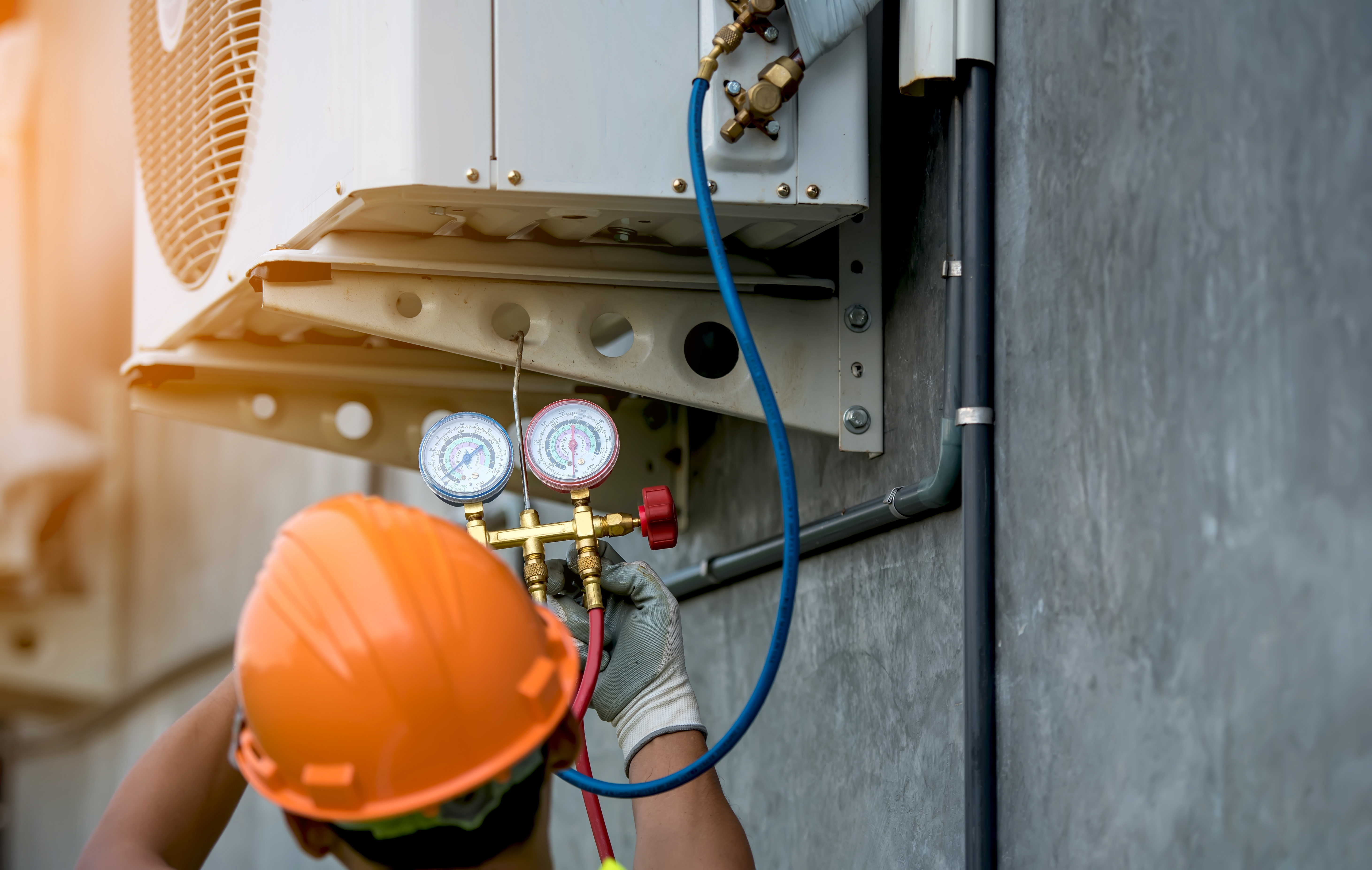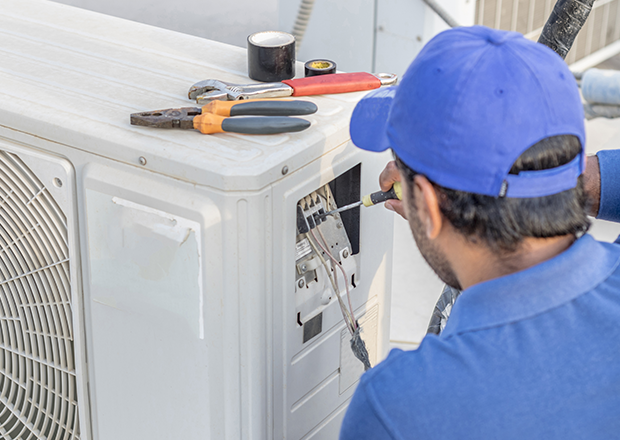How an AC repairman diagnoses grinding sounds
Everything about Cooling And Heating: Identifying Common Issues and Effective Air Conditioner Repair Approaches
Cooling and heating systems are essential for maintaining indoor convenience. Recognizing their parts and capability is important for identifying common concerns. Home owners typically encounter troubles such as inadequate cooling, weird odors, or climbing power prices. These indications can suggest underlying problems that might need attention. Checking out do it yourself troubleshooting methods can be advantageous, yet understanding when to seek professional aid is equally important. What actions can be required to guarantee long-lasting performance?
Understanding Your HVAC System: Elements and Performance
A HVAC system, often considered the backbone of interior environment control, contains numerous essential parts that work with each other to manage temperature and air quality. The main elements consist of the home heating unit, air flow system, and cooling system. The home heating device, usually a heating system or boiler, produces heat during cooler months, while the a/c unit cools down interior rooms during the summer.

Typical Cooling And Heating Troubles Home Owners Encounter
Homeowners usually face a number of typical cooling and heating problems, consisting of irregular temperature circulation throughout their home. Furthermore, unusual noises during procedure can show underlying issues that call for attention. Addressing these concerns promptly is vital for maintaining excellent system performance.
Inconsistent Temperature Level Circulation
Many homes experience the irritating issue of irregular temperature distribution, where particular spaces really feel annoyingly warm while others continue to be as well cool. This problem frequently arises from a selection of elements, consisting of bad insulation, obstructed vents, or an improperly sized heating and cooling system. When air ducts are not properly secured or when furnishings obstructs air flow, some areas may receive insufficient cooling. Additionally, thermostat placement can greatly affect temperature level law; a thermostat located in a sunlit area might misrepresent the general temperature of your home. Normal maintenance, including cleaning filters and making sure ductwork is clear, can aid relieve these inconsistencies. Homeowners may also think about zoning systems to much better control temperature levels throughout various locations of the home, advertising a much more comfy living environment.
Uncommon Noises Throughout Procedure
When a HVAC system operates, unusual sounds can show underlying concerns that need focus. Homeowners may experience a variety of audios, such as grinding, squeaking, or hissing. Grinding sounds typically signify worn-out bearings or parts, while squealing can recommend loose belts or components needing lubrication. Hissing may show a refrigerant leakage, which can endanger the system's performance. Furthermore, banging noises might indicate loose ductwork or a problem with the blower follower. Each of these noises acts as a warning, motivating homeowners to explore even more. Disregarding these signs can lead to even more considerable troubles and expensive repairs. Normal maintenance and timely interest to uncommon noises can enhance system long life and efficiency, making sure a comfortable living setting.
Signs That Indicate Your AC Needs Repair
Just how can one inform if their a/c system needs repair service? A number of signs might show underlying issues calling for professional attention. If the AC stops working to cool the space effectively, it might recommend a cooling agent leak or compressor breakdown. Furthermore, a boost in power costs without corresponding use changes can signal inefficiency in the system. Property owners should additionally look out to unusual smells emanating from the unit, which can show mold and mildew growth or electrical issues. In addition, if the a/c regularly cycles on and off, it may be an indicator of a faulty thermostat or other mechanical issues. Lastly, the existence of water pooling around the unit can indicate a clogged up drain line. Identifying these indications early can save time and cash, making sure that the air conditioning system operates effectively and efficiently.
Do It Yourself Troubleshooting Techniques for HVAC Issues
When encountering a/c concerns, house owners can utilize a number of do it yourself repairing methods to determine the issue. Trick approaches include examining thermostat settings, checking air filters, and reviewing drainage problems. These actions can assist determine typical breakdowns prior to seeking expert aid.
Checking Thermostat Setups
What actions should house owners take to ensure their thermostat settings are correct? They should verify the thermostat is set to the preferred temperature and setting, whether home heating or air conditioning. Looking for a clear screen and verifying the thermostat is not set hvac hiring to "hold" or "vacation" mode is vital. House owners must also confirm that the thermostat is degree and installed in an area devoid of drafts, straight sunlight, or various other temperature level affects. Furthermore, rectifying the thermostat can help offer accurate readings. If the thermostat operates batteries, changing them might fix any issues. By methodically examining these elements, house owners can frequently determine and rectify thermostat-related troubles, advertising ideal a/c system performance.
Inspecting Air Filters
Air filters play a crucial role in preserving excellent heating and cooling efficiency. They catch dust, irritants, and various other fragments, guaranteeing tidy air circulation. With time, filters can become clogged, lowering airflow and performance. To evaluate air filters, individuals must first find the filter, commonly found in the return air duct or near the heater. Once situated, they ought to examine the filter's condition-- if it appears unclean or tarnished, it likely needs replacement. A lot of filters need changing every 1-3 months, depending upon usage and environmental factors. Routine inspection and prompt substitute of air filters not only improve air quality yet additionally prolong the life expectancy of HVAC systems, preventing possible breakdowns and expensive repairs.
Examining Water Drainage Issues
Exactly how can house owners properly recognize and address drain problems within their heating and cooling systems? They need to check the condensate drainpipe line for clogs or blockages, which can lead to water build-up. Homeowners may utilize a wet/dry vacuum cleaner to remove any kind of debris obstructing the line. Next, inspecting the drainpipe frying pan for corrosion or leaks is important, as a harmed frying pan can create water to overflow. Regular cleaning of the drainpipe line with a try here combination of vinegar and water helps stop future obstructions. In addition, making sure correct slope of the drainpipe line promotes efficient water circulation. If these do it yourself strategies do not resolve the issue, consulting a specialist HVAC professional might be necessary to prevent prospective water damage and system failing.
When to Call a Professional for A/c Fixings

While some AC concerns can be managed via DIY approaches, there are scenarios where calling a specialist ends up being vital. Property owners must look for skilled aid when they come across relentless troubles, such as poor air conditioning, strange sounds, or unusual odors rising from the unit. These symptoms might show deeper concerns that require specialized knowledge and devices to detect and fix properly.

Preventative Maintenance Tips for Cooling And Heating Durability
Normal preventative upkeep can considerably enhance the long life of HVAC systems. Homeowners need to set up annual examinations by qualified specialists to examine system effectiveness and determine potential issues. Consistently transforming or cleaning air filters is crucial, as this assurances correct air flow and reduces strain on the internet system. Additionally, examining and securing ductwork prevents energy loss and boosts total performance.
It is also advisable to keep the outside system free from debris and plants, permitting for peak air movement and heat exchange. Property owners need to inspect the condensate drain for obstructions to stay clear of water damages and mold and mildew growth. Furthermore, keeping ideal thermostat settings and utilizing programmable alternatives can improve power performance. Recording upkeep activities assists track service background and can aid in determining reoccuring concerns. By complying with these preventative measures, people can make best use of the performance and life-span of their heating and cooling systems
Often Asked Concerns
Exactly how Typically Should I Change My HVAC System Filters?
Cooling and heating system filters must generally be replaced each to three months, depending upon usage, filter kind, and ecological variables. Regular substitute helps maintain efficiency and air top quality, making sure peak system efficiency throughout the year.
What Dimension Heating And Cooling System Do I Required for My Home?
To identify the suitable cooling and heating system dimension for a home, one must think about square footage, insulation top quality, and local environment. Consulting an expert can assist guarantee maximum effectiveness and convenience for the certain living space.
Exist Eco-Friendly Heating And Cooling Options Available?
Yes, green a/c options are offered, including energy-efficient heatpump, solar-powered systems, and geothermal heating. These choices minimize energy usage and ecological effect, promoting sustainability while maintaining effective climate control for household and commercial spaces.
Just How Can I Boost My a/c System's Energy Performance?
To improve cooling and heating energy effectiveness, one can regularly maintain the system, seal air leakages, set up programmable thermostats, make use of energy-efficient filters, and warranty adequate insulation throughout the home to reduce power usage and improve performance.

What Is the Typical Life Expectancy of a Heating And Cooling System?
The average lifespan of a HVAC system usually ranges from 15 to 25 years, relying on elements such as upkeep, usage, and the top quality of setup. Normal maintenance can substantially extend its functional longevity.
Verdict
In recap, a complete understanding of heating and cooling systems equips homeowners to identify typical concerns and address small problems successfully. Acknowledging indicators of malfunction, using do it yourself troubleshooting techniques, and focusing on normal upkeep can enhance system performance and efficiency. Nevertheless, when confronted with complex repair work, enlisting specialist help is critical to assure security and longevity. By cultivating awareness and aggressive care, individuals can delight in a comfy interior atmosphere while decreasing unforeseen costs connected with HVAC failures.